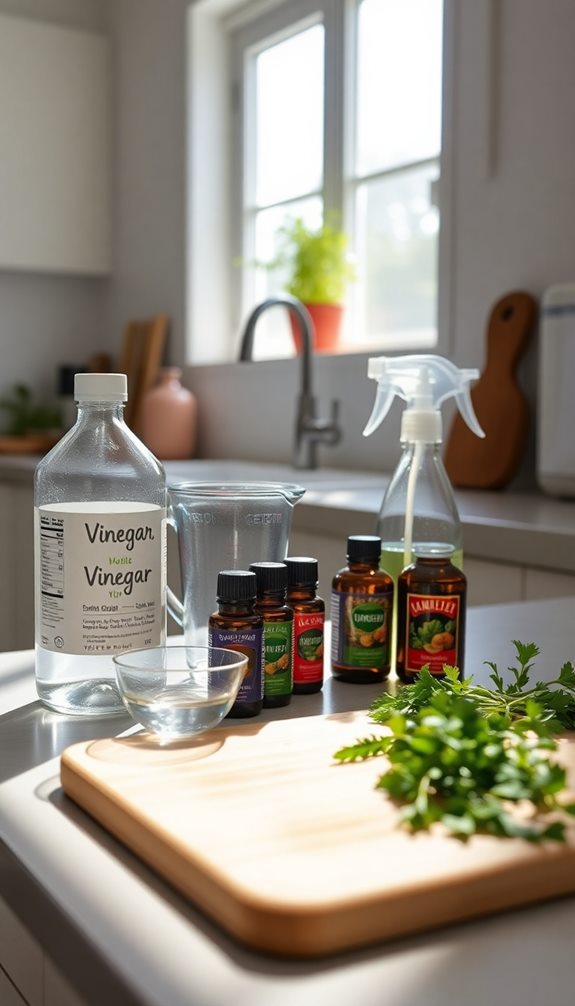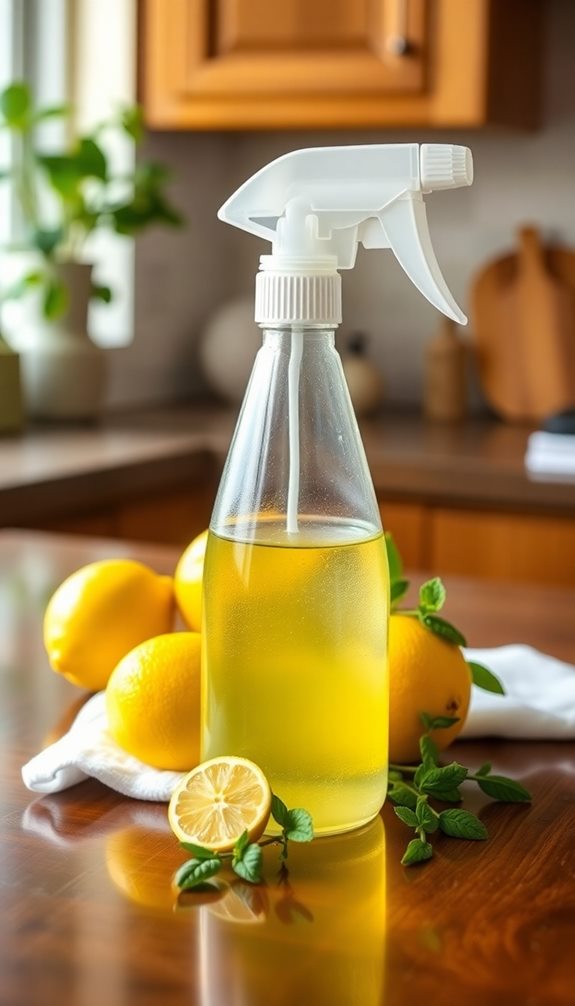You can easily make a homemade spray cleaner for your kitchen counters with just a few ingredients. Combine 1 cup of distilled white vinegar, 1 cup of water, and 2 tablespoons of rubbing alcohol in a spray bottle. If you want a pleasant scent, add 3 to 15 drops of your favorite essential oil, like lemon or tea tree. Shake the bottle well to mix everything together. To use, spray the cleaner directly on your counters and wipe with a microfiber cloth. For more tips on customizations and safety, keep exploring your options for effective home cleaning!
Why Make Your Own Cleaner
Making your own cleaner can be a smart choice for both your wallet and your health. By opting for homemade cleaning solutions, you can greatly cut down on expenses, as DIY cleaning typically costs much less than store-bought natural cleaners.
Plus, you eliminate harmful chemicals from your routine, creating a nontoxic kitchen environment that's safer for your family. Many popular eco-friendly options, such as Seventh Generation All-Purpose Cleaner, highlight the effectiveness of plant-based ingredients that you can easily replicate at home.
Using simple ingredients like vinegar and water, you can craft effective kitchen cleaners that tackle grease and grime. Not only are these solutions powerful natural disinfectants, but they also provide you with complete control over the ingredients you use.
You'll know exactly what's going onto your surfaces, ensuring a healthier space for cooking and dining.
Moreover, choosing to make your own cleaners contributes to environmental sustainability. By reducing reliance on commercial products, you help minimize plastic waste and lessen the carbon footprint associated with manufacturing and transporting these items.
Ingredients for Your Cleaner
Creating your own cleaner means you can select the best ingredients for effective and safe cleaning. Start with 1 cup of distilled white vinegar, which acts as a natural disinfectant. Mixing vinegar with water is a common safe method to remove kitchen grease and is a great way to maintain a clean environment.
Combine this with 1 cup of water to dilute the vinegar for a balanced cleaning spray. If you want to enhance the antibacterial properties and add a pleasant scent, consider incorporating 3 to 15 drops of essential oils such as lemon, tea tree, or grapefruit, based on your preference.
For even greater disinfecting power, you can add 2 tablespoons of rubbing alcohol (isopropyl alcohol) to the mixture. This combination will give you a powerful kitchen cleaner that tackles grime and germs effectively.
Store your cleaning spray in a 16-ounce glass spray bottle to avoid chemical leaching from plastic and promote sustainability.
If you need extra scrubbing power, a small amount of baking soda can be included; however, use it sparingly to prevent clogs in the spray nozzle.
With these simple ingredients, you'll have a reliable and safe cleaning spray to keep your kitchen counters sparkling clean.
Preparation Steps

To prepare your homemade spray cleaner, start by gathering all the necessary ingredients.
You'll need 1 1/2 cups of water, 3 tablespoons of distilled white vinegar, and 2 tablespoons of rubbing alcohol.
Vinegar isn't only great for cleaning but can also effectively tackle soap scum and mineral deposits on various surfaces, making it a versatile choice for your household cleaning needs.
If you prefer a scented alternative, mix 1 cup of distilled water with 1 cup of white vinegar, then add 10-15 drops of your chosen essential oils for a natural aroma that can also provide antibacterial properties.
Next, use a funnel to carefully transfer your mixed ingredients into a 16-ounce spray bottle.
This helps guarantee you don't spill any of your cleaning solution.
Once everything's in the bottle, shake it well to combine the ingredients thoroughly.
Usage Instructions
Once you've prepared your homemade spray cleaner, using it's straightforward. Start by shaking the bottle well to mix the essential oils and other ingredients.
Then, spray the cleaner directly onto your kitchen countertops or any surfaces that need attention. Focus on areas with heavy grease and grime, as the solution is designed to tackle tough messes. For added effectiveness, consider regularly wiping surfaces to reduce bacteria and odors, similar to the daily care recommended for maintaining sanitary kitchen environments.
Next, take a microfiber cloth or sponge and wipe the sprayed area. This step not only removes dirt but also helps disinfect the surface effectively.
For the best results, allow the surface to air dry. This drying process maximizes the disinfecting effect, ensuring any remaining bacteria are eliminated.
Before you immerse yourself, don't forget to perform a patch test on a small, inconspicuous area to check for compatibility with your countertop material. It's a quick way to avoid any unwanted reactions.
Benefits of Homemade Cleaners

Homemade cleaners offer cost-effective solutions that save you money while keeping your kitchen safe.
By utilizing natural ingredients like vinegar and baking soda, you can create a powerful cleaner that's effective against germs and mold without compromising your family's health.
You'll appreciate knowing that the ingredients are non-toxic, reducing your exposure to harmful chemicals.
Plus, you can customize the scent with your favorite essential oils, making cleaning a more enjoyable experience.
DIY non-toxic cleaners effectively maintain hygiene while promoting sustainable living.
Cost-Effective Cleaning Solutions
In today's world, finding cost-effective cleaning solutions can make a significant difference in your household budget. Homemade cleaners are a smart choice, often costing only a fraction of commercial cleaning products. By using bulk ingredients like distilled vinegar and essential oils, you can whip up effective cleaners without overspending.
Creating your own cleaning products allows for personalized cleaning experiences. You can customize scents and cleaning properties to suit your preferences, making the task more enjoyable.
Plus, when you opt for DIY solutions, you minimize exposure to harmful chemicals found in many store-bought options, promoting a nontoxic environment for your family.
Another significant benefit is the reduction of plastic waste. Homemade cleaners often come in repurposed glass containers rather than single-use plastic bottles. This simple switch helps lessen your environmental impact while keeping your kitchen clean.
The ease of preparing homemade cleaners means you can have a fresh solution ready in minutes. Embracing these cost-effective alternatives not only saves you money but also contributes to a healthier home and a cleaner planet.
Non-Toxic Ingredients Advantage
Making your own cleaning solutions not only cuts costs but also offers the advantage of using non-toxic ingredients. By opting for homemade cleaners, you reduce your exposure to harmful chemicals often found in commercial products. Ingredients like distilled white vinegar and essential oils provide a healthier indoor environment, which is especially important in food preparation areas.
Using essential oils, such as tea tree or lemon, can enhance your cleaner's antibacterial and antiviral properties. This means you're not only getting a clean surface but also protecting your family from germs. Plus, making these cleaners is cost-effective—basic ingredients are inexpensive and readily available.
Storing your homemade solutions in glass bottles contributes to sustainability by minimizing plastic waste and ensuring the essential oils maintain their integrity. This is particularly beneficial for households with children and pets, as DIY cleaners made from natural components lower the risk of chemical ingestion.
Incorporating non-toxic ingredients into your cleaning routine helps create safer households, allowing you to maintain a clean kitchen without compromising your family's health. Embrace the benefits of homemade cleaners and enjoy a cleaner, healthier home!
Customizable Aroma Options
One of the best perks of crafting your own cleaning solutions is the ability to customize aromas with a variety of essential oils.
You can easily transform the vinegar smell into a new scent that makes cleaning enjoyable. Here are some popular essential oils you might consider:
- Lemon – Offers a zesty, fresh scent and boosts your cleaner's effectiveness.
- Tea Tree Oil – Known for its antibacterial properties, it helps keep your surfaces germ-free.
- Lavender – Provides a calming aroma while also delivering antimicrobial benefits.
- Peppermint – Adds a revitalizing scent that can energize your cleaning routine.
Safety Considerations
When using your homemade spray cleaner, always prioritize safety by protecting your eyes and skin from potential irritation.
It's also wise to reflect on the benefits of choosing eco-friendly methods that minimize exposure to harsh chemicals.
Make sure to work in a well-ventilated area to help reduce any harmful fumes.
Plus, keep your cleaner stored out of reach of children and pets to prevent any accidents.
Eye and Skin Protection
Protecting your eyes and skin is vital while using homemade spray cleaners, especially those containing vinegar and essential oils. Here are some key safety tips to keep in mind:
- Wear gloves: Always use gloves when handling vinegar and essential oils. This helps prevent skin irritation or allergic reactions.
- Use goggles: Protect your eyes by wearing goggles or safety glasses, particularly when mixing concentrated cleaning solutions. You don't want any splashes getting in your eyes.
- Guarantee a well-ventilated area: Work in a well-ventilated space to minimize inhalation of strong vinegar fumes during mixing and application. This is vital for your respiratory health.
- Keep cleaning solutions out of reach: Store all cleaning solutions away from children and pets. Accidental exposure or ingestion can be dangerous, so take precautions to guarantee safety.
Additionally, before using any new essential oil, conduct a patch test on a small area of skin to check for potential allergic reactions.
Taking these steps will help you clean your kitchen safely and effectively, allowing you to enjoy a fresh space without worry.
Ventilation During Use
Ventilation plays a key role in guaranteeing your safety while using homemade spray cleaners. When you're using cleaners that contain vinegar or essential oils, it's essential to prevent inhaling concentrated fumes. To enhance airflow, open windows or doors while you clean. This simple act can greatly reduce the buildup of potentially irritating vapors.
Consider using a fan to help disperse strong odors and boost ventilation in your cleaning area. A well-ventilated space not only keeps you safe but also makes the cleaning process more pleasant.
After applying your homemade cleaner, confirm that the area remains well-ventilated for at least 30 minutes. This time allows any residual fumes to dissipate safely.
If you start to feel discomfort—like coughing or a burning sensation in your eyes—stop using the cleaner immediately. Ventilating the area at that moment is essential to protect your health.
Child and Pet Safety
Keeping homemade cleaners out of reach of children and pets is essential to preventing accidents in your home. By taking a few safety precautions, you can guarantee a safer environment while using your homemade cleaner.
- Store Safely: Always use child-proof spray bottles or containers to keep your homemade cleaner securely stored, reducing the risk of accidental ingestion or spills.
- Check for Allergies: Before using essential oils, test for any allergies. Some individuals may have sensitivities that could lead to skin irritation or respiratory issues.
- Ventilate the Area: Confirm the cleaning area is well-ventilated while using the spray cleaner. This helps minimize inhalation of any fumes or vapors that could be harmful.
- Teach Safe Practices: Instruct older children on safe cleaning practices and proper usage of the spray cleaner. This promotes responsible handling and helps them understand the importance of safety in the kitchen.
Conclusion
Now that you've crafted your own homemade spray cleaner, you might notice how much fresher your kitchen counters feel. Coincidentally, as you wipe down those surfaces, you're also reducing your exposure to harsh chemicals—just like a friend of mine did last week when she switched to homemade solutions. You'll not only save money but also enjoy the satisfaction of knowing exactly what's in your cleaner. So, keep spritzing and smiling—you've got this!